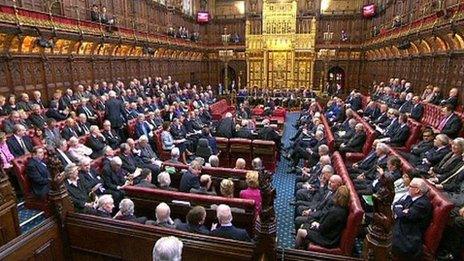EU Referendum Bill: Peers delay legislation
- Published

Peers voted to change the bill, ensuring it must return to the Commons.
The Conservatives have suffered a setback in their attempts to legislate for an "in-out" EU referendum in 2017.
A bill authorising a vote was approved by MPs earlier this month but there are doubts whether it will make it through the Lords before the end of the current session in April to become law.
Peers earlier voted by a majority of 87 to amend the wording of the referendum question proposed in the bill.
This means the bill must return to the Commons, endangering its passage.
David Cameron has said a referendum will be held in three years time if the Conservatives win the next election.
The Tories say the UK needs a "better deal" in Europe and the public should be asked to approve the outcome of a renegotiation in its membership, which would begin in earnest after the 2015 election.
'Reasonable shape'
A bill paving the way for a referendum was debated over eight hours in the Lords, with critics tabling a host of amendments in an effort to derail it.
Neither Labour nor the Lib Dems support the EU Referendum Bill, external, arguing that speculation over EU membership will damage inward investment and the economy as a whole over the next few years.
Supporters of the bill have warned peers against seeking to frustrate the legislation, saying it would be undemocratic to defy the will of the elected Commons.
Lord Hill, Conservative leader of the House of Lords, turned on Labour, Lib Dem, crossbench and Plaid Cymru peers who had tabled more than 80 amendments at committee stage - where the bill is subjected to detailed scrutiny.
"Although they daren't admit they do not think the British people should have their say, they are trying to do their dirty work unnoticed in the Lords," he said.
"Voters will see through this subterfuge and realise that only the Conservatives will give them their say on whether they should remain in the European Union."
The bill cleared its first hurdle in the House of Lords earlier this month when it was approved at second reading but its supporters have always maintained it would be touch-and-go whether it would make it into law.
'Dead parrot'
Matters raised on Friday include the government's powers to determine matters relating to the referendum; the end date for the timing of the referendum, the voting age, and the eligibility of expatriate voters and Gibraltarians to vote.
Lord Foulkes: "This is a very, very bad bill"
Peers voted by 245 votes to 158 to amend the question on the ballot paper, meaning the issue will return to the Commons for further discussion.
The Lords will meanwhile continue debating the Bill on Friday.
Referendum Bill 'could be killed" says Conservative Baroness Browning
As it stands, the bill states that voters should be asked: "Do you think that the UK should be a member of the EU?"
But former cabinet secretary and independent crossbencher Lord Armstrong said the question was "inappropriate, confusing and potentially misleading" and suggested the UK was seeking to join the EU.
Instead, he said the question that should be asked was: "Should the UK remain a member of the EU or leave the EU?"
The Electoral Commission has already said the existing question needs further thought, suggesting that some people are not aware that the UK is already a member and might not understand the premise as a result.
Lord Armstrong said the Lords should not "shirk its duty" to properly scrutinise the Bill and if the Commons was sufficiently keen to see it passed, they could "adjust" their procedures to provide more time.
Speaking in the Commons on Friday, Conservative MP Bill Cash said the bill was now a "dead parrot".
- Published10 January 2014
- Published29 November 2013